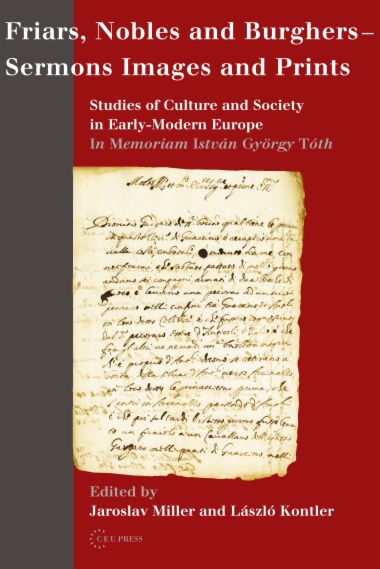The essays in this volume reflect the broader interpretation of culture as a system of shared meanings, values, attitudes and symbolic forms in any sphere of human life. Although thematically diverse, all these studies adhere to the concept of what is sometimes termed the new cultural history or socio-cultural history. The work opens with a cluster of methodological and historiographical reflections. Topics covered by the thematic sections include confessional and religious life in early modern Europe, symbolism and representation, strife and accommodation among different denominations compelled to live in a common space, order and hierarchy, cracks in the machinery of authority and the threat of disintegration as well as the history of alphabetization, literacy and reading and writing practices. This book pays tribute to István György Tóth (1956–2005), Head of the Department of Early-Modern History at the Institute of History of the Hungarian Academy of Sciences, and Professor of History at Central European University (both in Budapest), until his premature death in 2005.
- Cover
- Title page
- Copyright page
- Contents
- Farewell to István György Tóth
- Foreword
- I. Approaches and Historiographical Issues
- The Religious Borderlines of the
Confessionalization and Secularization of
European Culture and Societies
- The Value of Foreign Sources for the Understanding of National History
- Hungary and Bosnia 1387–1463: Between Stereotypes and New Interpretations
- II. Confessional and Religious Life
- II.1.Confessional Identities
- Eucharistic Iconography and the
Confessional Identity of the Saxon
Community in Early Modern Transylvania
- “Wider den grausamen Erbfeind deß Christlichen Nahmens”: Lutheran Military Chaplains from Württemberg in the Hungarian Wars against the Ottoman Empire in in the
in the Sixteenth and Seventeenth Centuries
- The Ambivalence of Exile:
Hungarian Exiles in Germany
in the Seventeenth Century
- The Counter-Reformation and the 1672 Kuruc Revolt
- II.2. Symbol and Representation
- A Funeral and a Political Pamphlet: The Funeral Sermon for the Archbishop Johann Schweikard of Mainz in 1626
- The Making of a Perfect Friar: Habit and Reform in the Franciscan Tradition
- II.3.Strife and Accommodation
- The Politics of Church Unification:
Efforts to Reunify the Utraquists and Rome in the 1520s
- Some Reflections on Uniatism in the Confederation of Poland and Lithuania in the Eighteenth Century
- II.4.
Religion, Empire and Ideology
- The Political Theologies of Empires: Jesuit Missionaries between Counter-Reformation
Europe and the Chinese Empire
- Conversion as an Instrument of Imperial Rule: The Case of the Russian Empire
- III. Society and Culture
- III.1.Order, Hierarchy andCultural Capital
- The “Bishops of the Hungarian Crown”: A Case Study in the Ecclesiastical, Social and Constitutional History of the 17th and 18th Centuries
- Levels of Group Loyalty at the Turn
of the Seventeenth and Eighteenth Centuries:
Kolozsvár in the Rákóczi War
of Independence
- Comparing the Enlightenment:
Men of Letters and Intellectual Work in Eighteenth-Century Naples
- III.2. Disorder, Discipline and
Denunciation
- Burning Germany:
Cities on Fire, Fire Fighting and Fire
Insurance in Early Modern Germany
- Orthodox Demonology and the Perception of Witchcraft in Early Modern Ukraine
- Punishment in Sixteenth-Century
Hungarian Towns
- III.3. Word and Print, Education and Literacy
- Reading Aloud: Between Oral and
Literate Communication
- A Virgin Deserving Paradise or a Whore Deserving Poison: Manuscript Tradition and Printed Books in Ottoman Turkish Society
- Education and Denominations in Transdanubia (1910)
- Register of Geographical Names
- Bibliography of István György Tóth
- List of Contributors
- Index of Personal Names
- Index of Geographical Names

